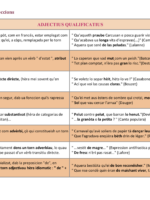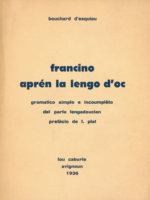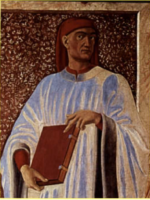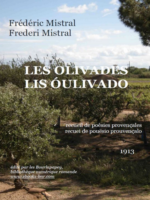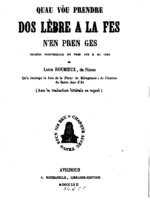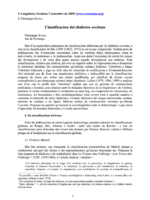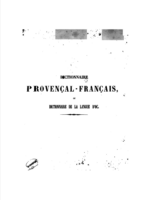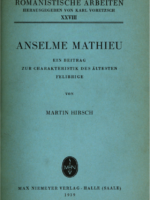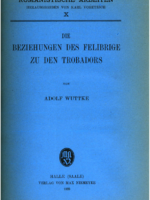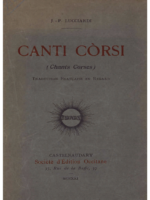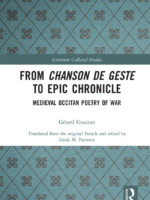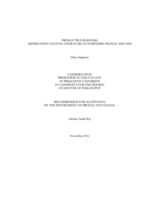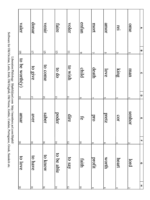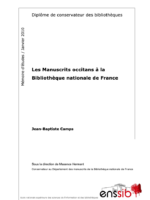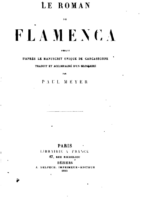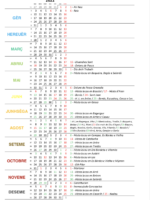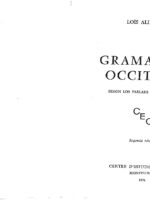Recommended Books
-
La lenga occitana en 100 tablèus
0,00 €La lenga en 100 tablèus qu’ei un tribalh de Pèir de Salas de cap aus punts precís de la lenga nosta illustrats per la màger part de citacions gessidas d’autors deu Biarn, de Gasconha e d’Occitania. Los tablèus que son dividits en tres tablèus : gramatica, fraseologia e traduccion.
-
Francino aprén la lengo d’oc
0,00 €Les ouvrages élémentaires qui présentent l’état actuel du parler occitanien à l’étude de la jeune génération — espoir et continuateur du Félibrige indéfectible dans son épanouissement, ces ouvrages conçus sur le modèle classique des méthodes grammaticales en usage dans les écoles publiques, n’auraient guère de raison d’être, à la suite des nombreuses publications faisant connaître les divers dialectes de notre belle langue.
Aussi bien, l’auteur de Francino aprèn la lengo d’Oc inaugure-t-il une méthode toute différente, grâce à laquelle l’intérêt éveillé chez l’élève efface ce qu’il y a de rébarbatif dans l’étude: sa nièce Francine, à l’âge où l’on commence à noter les différences d’élocution dans les conversations familières des camarades, à s’étonner et même à se moquer d’expressions qui fleurent le terroir, du moins, de l’avis de ces jeunes inexpériences, est rendue attentive à l’impropriété de transposer littéralement en français ces occitanismes de bonne marque et pour en éviter le mélange, se fait expliquer la valeur des expressions d’Oc, se pique au jeu et s’attache à en découvrir les beautés idiomatiques. Le français ne s’y perfectionne pas moins que l’occitanien: si bien que, son enthousiasme de néophyte aidant, elle va dépasser la mesure, ferait fi des origines latines de son parler, origines qu’elle n’est plus éloignée de placer au-dessus des divers dialectes d’Oc: Mais, mon oncle, s’écrie Francine, vous n’y pensez pas! Ce mot est un gallicisme!
Sous cette apparence bon enfant, il ne faudrait pas, néanmoins, mésestimer la valeur de l’ouvrage que M. Bouchard d’Esquieu offre aujourd’hui à la sagacité de nos étudiants méridionaux: serait-il donc à propos d’en supprimer ce qui constitue l’originalité d’une œuvre didactique si parfaitement agencée que, d’une petite personne dédaigneuse et moqueuse, il a fait une enthousiaste, qu’il faut même rappeler à la réalité des faits, que son imagination créerait volontiers pour le bouleversement de la philologie officielle?
Peu d’auteurs ont su rendre attrayante à la jeunesse une matière si spéciale.
-
Lo Decameronet
0,00 €Lo seu títol es, de bon entendre, una guinhada de cap a la tradicion bocaciana. Per çò qu’es de l’“encastre” : un rodelet d’escrivans congressistas que sobrevivon un moment aclapats dels escombres d’un castel d’Urbino, enganan la mòrt en jogant sus Eròs e donan biais a sas fantaumas personalas. La “cort d’amor” del Bocaci ven aital una caunha, anticipacion del clôt ; mas se tracha totjorn d’una allegoria de la paraula creatritz que desfisa la mòrt.
La primiera persona de cadun dels charraires es lo mejan d’esconjurar la malemparada, en fondamentant sul lengatge la certitud d’una realitat multiforma. Dins la festa dels paraulisses, jos la fusta pintada que retarda lo desastre, s’entrenan istôria e mites, versemblanças e inversemblanças de l’escaquièr cultural europenc. Lo mistèri que plomba sus aqueles racontes, per la màger part “sens solucion”, nos convida sai que a formular d’ipotèsis recebablas de sobrevivença en delà de l’apocalipsi de la civilizacion planificada d’ara que sèm. Pr’amor d’aquô, la majoritat son de somiarias solaras en omenatge a l’aire liure e a la libertat del desir uman.
-
Classificacion dei dialèctes occitans
0,00 €Mai d’un especialista prepausan de classificacions diferentas per lei dialèctes occitans, e mai se la classificacion de Bèc (1995 [1963], 1973) es uei la pus vulgarizada. Tanben pron de publicacions fan d’omissions recurrentas subre de varietats fòrça interessantas coma lo sud-vivarés, lo mentonasc o lo judeooccitan. Aquò nos dona l’escasença de cercar lei causas dei divergéncias e de veire dins quina mesura aquelei divergéncias son relativas. Tota classificacion, relativa que relativa, pòt aver un impacte subre lei representacions e dramatizar lo sentiment identitari dei renaissentistas qu’utilizan certanei dialèctes. Contribuís a fargar l’identitat dialectala e jòga un ròtle dins lei chausidas de codificacion e d’estandardizacion. Aicí pretendi pas de fixar una arquitectura definitiva e indiscutibla per la classificacion: prepausi de pistas per trobar una sintèsi equilibrada, per clarificar de tèrmes sovent contradictòris e per desmontar certanei mites identitaris. Lafont (1979, 1996, 1999) a explicat mai d’un còp lo perilh deis “identitats” rigidas que son en generau de construccions artificialas e recentas, sens relacion amb lei donadas objectivas de la lingüistica e de l’istòria; pasmens lo mitan renaissentista (o occitanista au sens larg, en comprenent lei classicistas, lei mistralencs, lei bonaudians e leis escòladaupoïstas) rèsta sovent sord a aqueleis analisis e contunha d’entretenir de mites dialectaus. Certanei defensors dei lengas minorizadas vesinas, subretot de catalans e de ligurs, fabrican tanben de construccions erronèas qu’afèctan l’occitan. Prepausi un apròchi qu’assòcia la sociolingüistica amb la dialectologia1 e que cèrca d’apreendre lei donadas dialectalas a l’escala panoccitana.
-
-
From Chanson de Geste to Epic Chronicle: Medieval Occitan Poetry of War
0,00 €In this collection of essays Gérard Gouiran, one of the world’s leading and much- loved scholars of medieval Occitan literature, examines this literature from a primarily historical perspective. Through texts offering hitherto unexplored insights into the history and culture of medieval Europe, he studies topics such as the representation of alterity through female figures and Saracens in opposition to the ideal of the Christian knight; the ways in which the narrating of history can become resistance and propaganda discourse in the clash between the Catholic Church and the French on the one hand and the Cathar heretics and the people of Occitania on the other; questions of intertextuality and intercultural relations; cultural representations fashioning the West in contact with the East; and Christian dissidence in the twelfth and thirteenth centuries. Written in an approachable style, the book will be of historical, literary and philological interest to scholars and students, as well as any reader curious about this hitherto little-known Occitan literature.
Gérard Gouiran was born in 1945 at Le Rove, which was then a small village close to Marseille. His parents often spoke Occitan between themselves but avoided doing so with their children for fear of damaging their education. It was only after studying classics in Marseille and then Paris that Professor Gouiran rediscovered the Occitan language, and from then on he has devoted himself to medieval literature. Best known for his magisterial edition of the troubadour Bertran de Born, he has written – and spoken – widely on troubadour lyric, epic and romance.
Linda M. Paterson taught at Northeastern University, Boston, USA, for two years before moving to the University of Warwick, UK, in 1971, where she is now Professor Emerita. Her books include Troubadours and Eloquence (1975); The World of the Troubadours: Medieval Occitan Society, c.1100–c.1250 (1993); Culture and Society in Medieval Occitania (2011); and Singing the Crusades: French and Occitan Lyric Responses to the Crusading Movement, 1137–1336 (2018).
-
French troubadours: assimilating Occitan literature in northern France (1200-1400)
0,00 €French Troubadours explores the reception of Occitan lyric in France in the thirteenth and fourteenth centuries, that is, in the period corresponding to the Albigensian Crusade (1209–1229) and its aftermath, which witnessed France’s annexation of the majority of Occitania. Surveying the corpus of French romances that quote Occitan song (Part I) and French songbooks that also contain Occitan lyrics (Part II), it shows how Occitan poems–from the very beginning of their French reception–were subtly incorporated into the French canon by way of imitation, compilation with French texts, and adaptation to the French sound system.
Chapter 1, on Jean Renart’s Roman de la rose, shows how the troubadours are collapsed into a set of francophone lyrics, which are enjoyed not in France but by the Holy Roman Emperor. French-language lyric, and other forms of French culture, are presented as the degre zero of culture in the German Empire, while Germanic languages are treated as foreign. In Chapter 2, I turn to Gerbert de Montreuil’s Roman de la violette, which, like Renart’s Rose, appropriates troubadour lyrics linguistically, and–in one instance–also associates them with the Holy Roman Empire. Here, however, the Holy Roman Empire is not a neutral cadre, but a negative space. Chapter 3, devoted to Richard de Fournival’s Bestiaire d’amour, shows how Richard obscures the first-person language and rhyme of the troubadour poems he quotes.
In Part II, I turn to the set of French songbooks that transmit Occitan lyric. A study of compilation patterns reveals that, rather than being transmitted in a separate section of songbooks, Occitan poems–which are often Gallicized–are almost always interspersed with French lyrics. Consequently, a medieval reader who encountered the troubadours only in French transmission would have little chance of recognizing their cultural specificity. In Chapter 5, I explore the “pseudo-Occitan” corpus, which comprises pieces that contain Occitan phonological coloring but were probably composed by francophones. I show that these pieces occur primarily in a lower register. This trend fictionally repositions Occitan lyric as both “primitive” and–by extension–as anterior to French lyric.
-
Old Occitan Flash Cards
0,00 €Liberation Philology libphil@aol.com.
Software for Icelandic, Norwegian, Danish, Swedish, Finnish, Old Norse, Gothic, Latin, Old English , Greek, Sanskrit etc. -
Les manuscrits occitans à la Bibliothèque nationale de France
0,00 €La Bibliothèque nationale de France conserve, pour le domaine de la littérature oc- citane du Moyen Âge, la plus vaste collection de manuscrits au niveau mondial. Pourtant, en dépit de son extraordinaire richesse, cette collection n’a qu’assez rarement été prise en compte en tant que telle et, quoique très étudiée par les chercheurs, demeure à certains égards méconnue. Une cause probable en est le fait que les manuscrits occitans, cotés en Français ou en Latin, ne constituent pas un fonds cohérent à l’origine unique, mais ont été acquis en divers lieux et en divers temps, sans faire l’objet d’une cotation propre. Ce mémoire se donne pour ambition de fournir un outil de connaissance de cette collection, qui soit profitable aux démarches de valorisation et de conservation le concernant.
-

